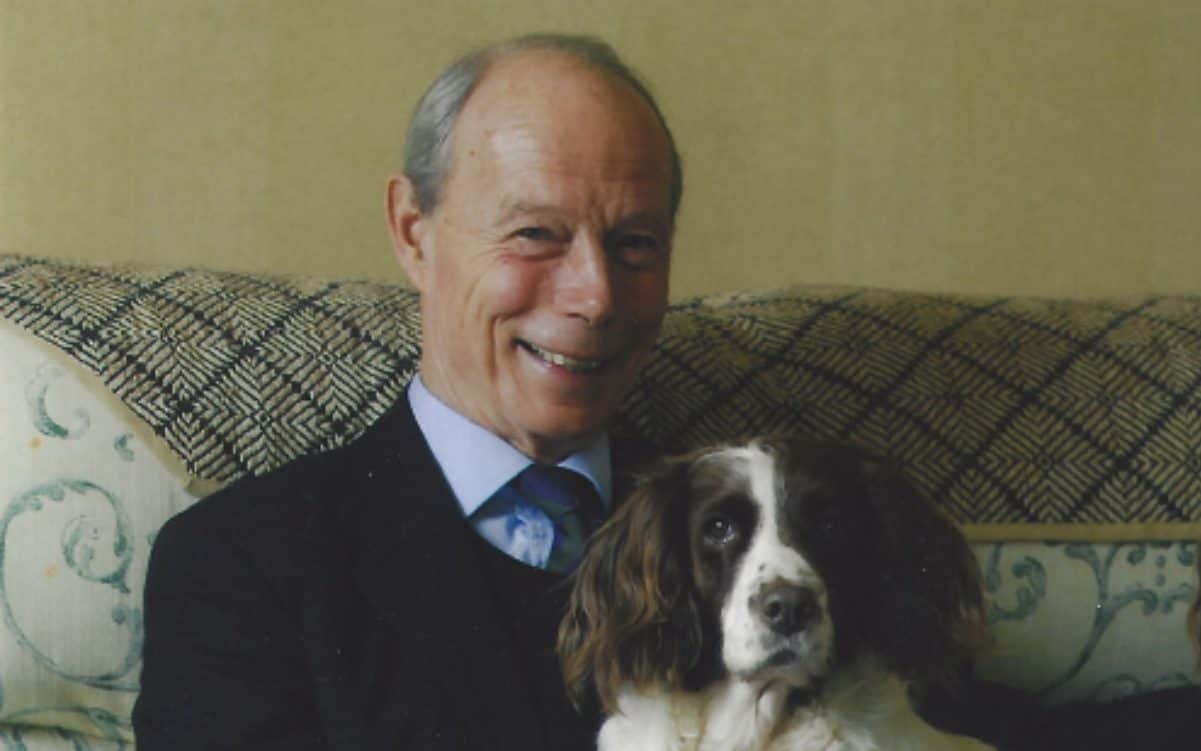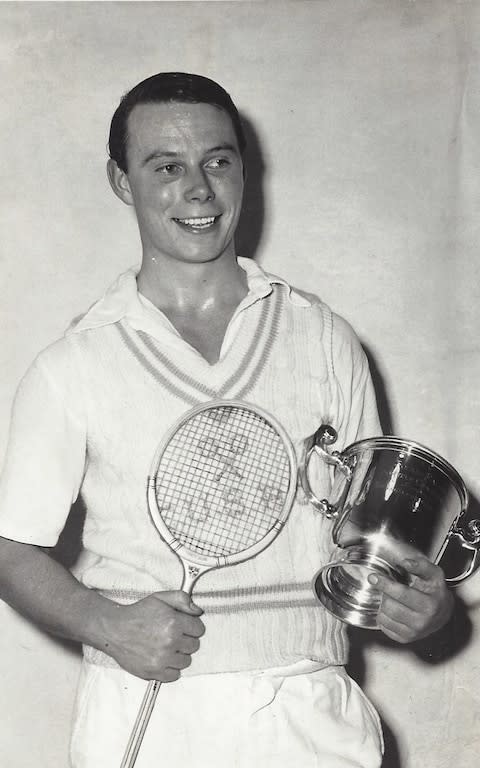Sir Nigel Broomfield, squash champion and Army officer turned diplomat who served as Ambassador in East, then unified, Germany – obituary

Sir Nigel Broomfield, who has died aged 81, ended his career in the Diplomatic Service as Ambassador to Germany; he was a diplomat almost by accident, having chosen the Army as his career.
An outstanding athlete, Broomfield admitted that he saw the military as the best place in which to go on playing the games he loved – tennis, cricket, golf, rugby and, above all, squash. He won the Drysdale Cup, the national squash competition for schoolboys, for three years running and then in 1958, aged 20, the British Amateur Championship, a feat he repeated the following year while still at university.

Broomfield’s choice of regiment on leaving Cambridge was the 17th/21st Lancers. It was, as a brother officer remarked, a strange decision, since Broomfield “loathed horses” and the regiment’s main pastimes were polo and poker. He was once reprimanded on parade for “dismounting without leave” – in other words he fell off his horse. But he proved exceptionally skilled at manoeuvring his squadron of Centurion tanks on the North German Plain and seemed destined for high command.
In 1968 he decided, however, to leave the Army as a major and join the Foreign Office. He had enjoyed an exciting spell as a member of Brixmis, the British military mission to Soviet forces in East Germany. In theory a military liaison mission, established in 1946, Brixmis became during the Cold War a legitimate subterfuge for driving around East Germany in uniform and gathering military intelligence in a cat-and-mouse game with the Warsaw Pact.
Brixmis had a specialist map-making team, electronics, signals and photographic experts and light aircraft with RAF pilots. The Russians did everything they could to frustrate it, however, including hostile following, punctures and road closures. Rammings and collisions were common and a situation in which a mission crew was trapped at front and back by a Soviet vehicle became known as a “Brixmis sandwich”.
Nigel Broomfield was born on March 19 1937 in Nowshahar, India (now in Pakistan), the son of Colonel Arthur Broomfield, Indian Army, and his wife Ruth. His childhood was spent in India, and he retained a lifelong affection for the country.
The family returned to England on Independence in 1947. He was educated at Haileybury and at Trinity College, Cambridge, where he read English.
Broomfield’s career in the Diplomatic Service concentrated almost entirely on German and Soviet affairs. He had taught himself both German and Russian while in the Army, and his first posting was to Bonn, followed by Moscow and Berlin. He did the course at the Royal College of Defence Studies in 1978 and was appointed Head of the Eastern European and Soviet Department in the Foreign Office in 1981.
This was a particularly tense time in East-West relations, with the collapse of the Comprehensive Nuclear Test-Ban negotiations and the Soviet Union’s deployment of SS-20 nuclear-capable rockets in East Germany. The US responded by stationing Pershing and cruise missiles in Nato countries.
President Reagan’s Strategic Defence Initiative – “Star Wars” – encouraged the geriatric Russian leadership to fear a pre-emptive nuclear strike. It was a time for cool heads in London and Washington, and Broomfield’s knowledge and experience of the Soviet Union, working in tandem with Sir Julian Bullard, the Foreign Office’s Political Director, helped to calm Whitehall.
On September 1 1983 a Korean airliner, KAL 007, strayed into Soviet prohibited air space and was shot down by air-to-air missiles with the loss of 269 lives. There was an international storm, with finger-pointing, denials and calls for retribution.

Again, Broomfield was effective in presenting the long-term case for being on terms with Moscow and pursuing arms control agreements. He had the capacity, while dealing with day-to-day issues with immense dedication and diligence, to look to the future as well. Though many have claimed foresight, he was one of the first to see Mikhail Gorbachev as the future Soviet leader and he argued that he should be invited to London as the guest of the Prime Minister, Margaret Thatcher.
In 1985 Broomfield was appointed Minister in New Delhi, fulfilling a lifelong ambition to return to India. He loved India, without any nostalgia for the Raj, and developed a vast range of Indian friends, from tennis players to politicians. But it was not to last, and after three years he was recalled to London as Deputy Under Secretary for Defence, a post in which his military background held him in good stead during the First Gulf War that threw Saddam Hussein out of Kuwait.
In 1988 Broomfield was appointed Ambassador to East Germany, where the embassy concerts he held were said to be much appreciated by members of the democratic opposition to the dictatorship because the music masked their conversations, allowing them to confer together without being heard by Stasi microphones.
The following year he witnessed the fall of the Berlin Wall – driving over to the West in his silver Jaguar with Union flag flying – along with the reunification of Germany and the end of the Soviet Empire in Eastern Europe. His vivid reports on the collapse of the communist regime and his recommendations for British policy were much valued in the Foreign Office.
His last post was as Ambassador to Germany from 1993 to 1997. It was now a united Germany; the Soviet Union had collapsed and, despite the chaos of the Yeltsin years in Russia, it looked as though a new era of East/West relations was possible.
For Broomfield, it was a high point. He was fascinated by German politics and personalities, regarding knowledge of their culture and language as vital tools of his trade. Though he was always kind and courteous, with a self-deprecating humour, there was an underlying steely determination, and capacity for hard work, which won him respect at all levels.
He belonged to a generation whose tenacity and skill, backed by Western cohesion and sense of common purpose, contained, and finally overcame, the Soviet threat. He was dismayed by the policies of President Trump, the prospect of Brexit and the rise of populism in Eastern Europe.
On retirement from the Diplomatic Service in 1997 Broomfield was appointed Director of the Ditchley Foundation in Oxfordshire, originally intended to promote Anglo/American relations but which widened its scope to become a leading international institution for the discussion of world affairs. Broomfield found the intellectual stimulation of running Ditchley a welcome relief after the grind of the Foreign Office and regarded his time there, together with his posting to India, as the most enjoyable of his career. His wife, Valerie, kept horses at Ditchley while her husband avoided the stable yard.
After Ditchley he took on a number of non-executive appointments and went to live in Jersey, where his wife’s family came from. As a practising Christian he had a strong social conscience: he was chairman of Leonard Cheshire Disability and spent many hours helping a disabled neighbour with household chores during his busiest period at the Foreign Office.
He was endearingly modest about his own achievements and always praised and encouraged his staff. Beneath a slightly reserved manner, he had a great sense of fun. Faced with a refusal by the maître d’ at the RAC Club in Pall Mall to let his guest, a Polish dissident, into the dining room because he was not wearing a tie or jacket, Broomfield had a practical solution. He fashioned a tie from a piece of ribbon and persuaded his lady guest to let the Polish dissident squeeze into her bright pink jacket.
The pink jacket belonged to Judith Brown, later Dame Judith Macgregor, High Commissioner to South Africa, while the tieless dissident, Janusz Onyszkiewicz, became Minister of Defence of Poland.
Nigel Broomfield was appointed KCMG in 1993.
He married Valerie Fenton in 1963; she survives him with their two sons.
Sir Nigel Broomfield, born March 19 1937, died October 29 2018

 Yahoo News
Yahoo News 
